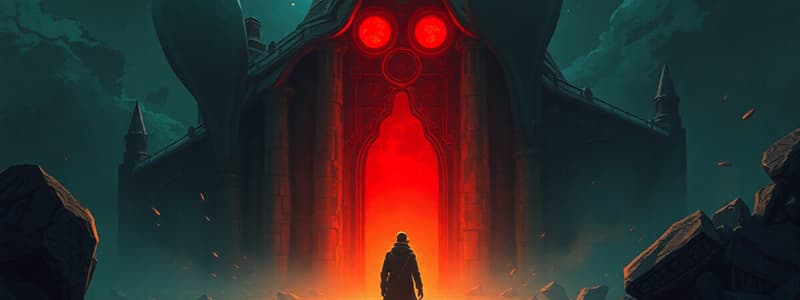Podcast
Questions and Answers
What is insinuated by Fontaine's actions towards Max, such as offering him food and asking about school, after they leave Kiskunhalas?
What is insinuated by Fontaine's actions towards Max, such as offering him food and asking about school, after they leave Kiskunhalas?
- Fontaine is trying to appeal to Max so he will accept better treatment as a white American boy and forget about Ahmed. (correct)
- Fontaine genuinely cares about Max's well-being and is trying to distract him from the stress of the situation.
- Fontaine is deliberately trying to make Max uncomfortable and guilty for Ahmed's situation.
- Fontaine is attempting to gather information about Ahmed through Max.
Why does Max become angry with Fontaine's attempts to help or comfort him?
Why does Max become angry with Fontaine's attempts to help or comfort him?
- Max resents Fontaine's attempts to speak French, which Max does not fully understand.
- Max is upset that Fontaine did not involve the authorities sooner to resolve the situation with Ahmed's detention.
- Max believes that Fontaine's efforts are insincere and that he secretly blames Max for Ahmed's troubles.
- Max feels that Fontaine's help is misplaced, as Ahmed is the one deserving of apologies and second chances, not him. (correct)
What does Max's reaction to Fontaine's story about asking the directrice for Ahmed's identification card reveal about Max's feelings?
What does Max's reaction to Fontaine's story about asking the directrice for Ahmed's identification card reveal about Max's feelings?
- Max is concerned that Fontaine's actions will lead to the exposure of Ahmed's father's location.
- Max is worried about the legal consequences Oscar might face for creating the false identification card.
- Max is appreciative of Fontaine's thoroughness in tracking them down, as it shows genuine care for Ahmed's situation.
- Max is glad that Oscar protected them by lying and is relieved that Oscar may not face severe consequences. (correct)
What does Fontaine's discovery of the search for Ibrahim Malaki's address in Molenbeek reveal about Fontaine's investigative methods?
What does Fontaine's discovery of the search for Ibrahim Malaki's address in Molenbeek reveal about Fontaine's investigative methods?
What main idea is Fontaine trying to convey when he says, "Europe was in ruins in 1945, but by the time I was a boy, just a few decades after, it had rebuilt itself."
What main idea is Fontaine trying to convey when he says, "Europe was in ruins in 1945, but by the time I was a boy, just a few decades after, it had rebuilt itself."
What is the significance of the contrast between Fontaine's happy memories of his childhood and his parents' experiences during the war?
What is the significance of the contrast between Fontaine's happy memories of his childhood and his parents' experiences during the war?
What is the underlying conflict between Max and Fontaine regarding Ahmed's situation?
What is the underlying conflict between Max and Fontaine regarding Ahmed's situation?
How does the mention of Albert Jonnart and Fontaine's grandfather contribute to the development of Fontaine's character?
How does the mention of Albert Jonnart and Fontaine's grandfather contribute to the development of Fontaine's character?
What does Max mean when he tells Fontaine, "You can't know what anyone's worth unless you give them a chance."
What does Max mean when he tells Fontaine, "You can't know what anyone's worth unless you give them a chance."
How does the ending of the passage, where Max acknowledges that Ahmed is with his father but insists that he belongs in school, contribute to the overall theme?
How does the ending of the passage, where Max acknowledges that Ahmed is with his father but insists that he belongs in school, contribute to the overall theme?
Flashcards
Directrice
Directrice
Director of an institution, usually female.
Compassion
Compassion
A feeling of deep sympathy and sorrow for someone struck by misfortune, often accompanied by a desire to alleviate their suffering.
Savior / Rescuer
Savior / Rescuer
A person who helps someone seeking refuge (shelter from danger).
Collaborator
Collaborator
Signup and view all the flashcards
Fragile
Fragile
Signup and view all the flashcards
Study Notes
- Max and Inspector Fontaine are on a Ryanair plane headed to Charleroi after leaving Kiskunhalas
- Fontaine tried to comfort Max with food and conversation, but Max was angry because he felt Ahmed deserved the help, not him
- Brussels Airport is closed so they fly into Charleroi, an hour's drive south
- Max asks Fontaine how he found them so quickly
- Fontaine asked the directrice for Ahmed's ID and found Oscar, who made the fake ID for Ahmed
- Oscar claimed to know nothing about the affair, but Fontaine knew he was lying
- Madame Pauline mentioned Farah, who Max realizes could have guessed their plan
- Farah's father claims she doesn't involve herself in mischief, relieving Max
- Fontaine found a search for an address for Ibrahim Malaki in Molenbeek on Oscar's computer
- Fontaine spoke to Ibrahim and learned that Ahmed's father was at Kiskunhalas
- Max reflects on Ahmed's lack of freedom as the plane takes off
Conversation on Ideals
- Max questions how Fontaine could think Ahmed was a terrorist
- Fontaine says Ahmed acted like one by hiding and breaking the law
- Max counters by saying Ahmed was taking care of his grandfather's garden, which he obviously loved
- Fontaine says Ahmed could not love it like he does, as it is his garden where he played as a boy
- Fontaine reminisces about his peaceful childhood before the war
- Max says Ahmed told him about the effects of war
- Fontaine claims Europe was in ruins in 1945 but there was unity and cooperation in Western Europe by the time he was a boy
- Max interrupts, asking what it has to do with Ahmed
Clash of Ideals
- Fontaine says migrants threaten European unity, because over million of them came last year
- Fontaine says Europe is young and fragile and could fall into chaos if it breaks down because of migrants
- Max says Ahmed was escaping chaos and war and should be shown compassion, like Albert Jonnart, who saved a Jewish boy during the war
- Max questions if it was Fontaine's grandfather who betrayed Jonnart
- Fontaine says his grandfather did nothing, implying he was not a hero but not a collaborator either
- Max suggests that Fontaine agreeing that Jonnart was a hero is in contradiction to the way he is behaving now
- Fontaine states Ahmed's situation is different
- Max says Ahmed just wanted to go to school, questioning what's so dangerous about that
- Fontaine says that Ahmed broke the law by staying in Belgium and Max did too by registering him in school and without laws, society can't function
- Max questions what if the law is wrong
- Fontaine asks what if the heart is wrong and what if they let all these people into your country and they turn out to be bad and not worth your sacrifice
- Max wishes he could convey that Ahmed's situation has made him feel more worthy
- Max argues you can't know what anyone's worth unless you give them a chance
- Fontaine agrees Ahmed belongs with his father
- Max believes Ahmed belongs in school, not in a prison
Studying That Suits You
Use AI to generate personalized quizzes and flashcards to suit your learning preferences.





